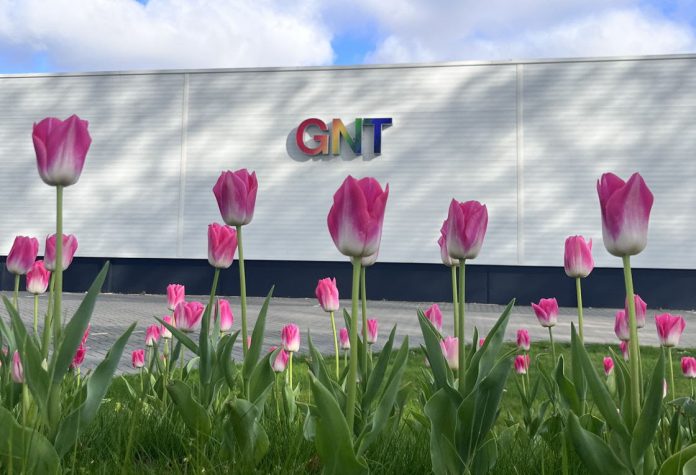
GNT Group, a family-owned company pioneering in the creation of plant-based, sustainable ingredients, has passed the halfway mark in its mission to reduce carbon intensity at its Exberry color factories, a leading global brand of plant-based, sustainable colors for food and drinks by 50% over the course of the current decade.
Based on volume of product sold, GNT cut carbon emissions at its production sites in the Netherlands, Germany, and United States by 26% between 2020 and 2024. This achievement is particularly significant in light of the company’s growth during the same period.
Global sales for plant-based Exberry colors have increased more than 50% since 2020. Under normal circumstances, such growth would have driven a substantial increase in total carbon emissions due to increased production demands. However, by improving efficiency and investing in sustainable technologies, GNT has been able to keep overall emissions in check.
GNT’s new sustainability report reveals there has been strong progress toward many of the 17 sustainability targets it is working to achieve by 2030.
Water efficiency at its factories has improved by 30% compared to 2020, which already surpasses the original 20% goal. The company is also committed to ensuring every contract farmer growing fruits, vegetables, and plants for Exberry colors enrolls in sustainable agriculture training programs. By the end of 2024, 80% had achieved the level of FSA (Farm Sustainability Assessment) Silver or Gold.
In addition to its environmental aims, GNT’s targets include measures to benefit people throughout the Exberry value chain. In 2024, the lost-time accident rate at the factories fell to 25% below the industry average. The company also helped organize a three-day leadership training program in Peru as part of its commitment to supporting social livelihood projects in its sourcing areas.
Hendrik Hoeck, CEO at GNT Group, said, “We are proud to say that we are still delivering on our ambitious plans to protect people and planet while achieving significant global growth. Our 2024 report underlines our continued determination to lead the food coloring industry on sustainability and ensure that GNT is in a position to thrive for generations to come.”
GNT secured an EcoVadis gold medal last year for its environmental and ethical activities, with its score placing the company among the top 3% in the food manufacturing industry.
It is now working on plans to go even further in 2025. With GNT on track to meet its CO2 targets at its factories, the top priority going forward is to reduce indirect emissions from throughout its wider value chain.
Rutger de Kort, sustainability manager at GNT Group, said, “We have made excellent progress at our production sites and now need to work with our suppliers to achieve reductions in other areas. This is more challenging as these emissions are outside our direct control, but our closely managed supply chain gives us a real advantage and we are developing plans to address the biggest hotspots.”
In line with its commitment to transparency, GNT secures independent verification for its emissions data. It also offers its customers product environmental footprint information across scopes 1, 2, and 3 for Exberry colors.
Rutger de Kort added, “Trust is hugely important to us. This is why we publish independently audited greenhouse gas verification statements and provide our customers with the data they need to make informed decisions about how to optimize their recipes.”
IndiFoodBev — authentic, impactful and influential
An English-language food and beverage processing and packaging industry B2B platform in print and web, IndiFoodBev is in its third year of publication. It is said that the Indian food and beverage industries represent approximately US$ 900 billion in revenues which implies more than 20% of the country’s GDP. Eliminating the wastage on the farmside can help to deliver more protein to a higher number of the population apart from generating sizable exports. The savings in soil, seeds, water, fertilizer, energy and ultimately food and nutrition could be the most immense contribution that country is poised to make to the moderation of climate change.
To improve your marketing and grow sales to the food and beverage processing and packaging industry, talk to us. Our research and consulting company IppStar [www.ippstar.org] can assess your potential and addressable markets in light of the competition. We can discuss marketing, communication, and sales strategies for market entry and growth.
Suppliers and service providers with a strategy and budget for targeted marketing can discuss using our hybrid print, web, video, and social media channels to create brand recognition linked to market relevance. Our technical writers are ready to meet you and your customers for content.
The second largest producer of fruit and vegetables in the world is continuously expanding processing capacities and delivery systems with appropriate innovative technologies. We cover product and consumer trends, nutrition, processing, research, equipment and packaging from farm to thali. Get our 2025 media kit and recalibrate your role in this dynamic market. Enhance your visibility and relevance to existing markets and turn potential customers into conversations. Ask for a sample copy of our bi-monthly in print or our weekly IndiFoodBev eZine each Wednesday.
For editorial info@ippgroup.in — for advertisement ads1@ippgroup.in and for subscriptions subscription@ippgroup.in
Naresh Khanna – 10 February 2025
Subscribe Now










